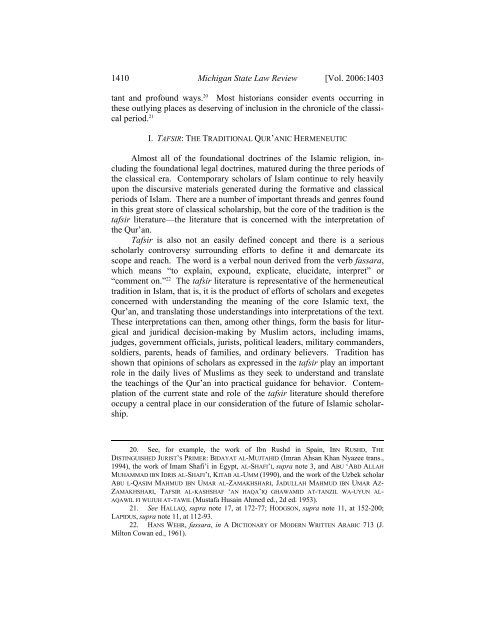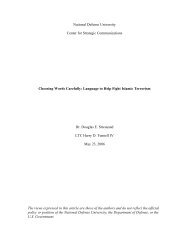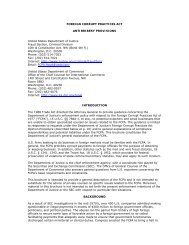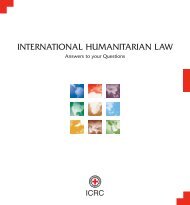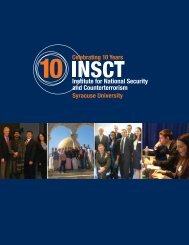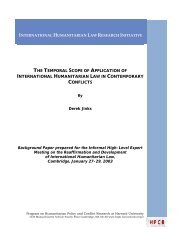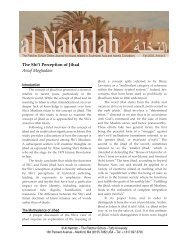1410 Michigan State Law Review [Vol. 2006:1403tant and profound ways. 20 Most historians c<strong>on</strong>sider events occurring inthese outlying places as deserving of inclusi<strong>on</strong> in the chr<strong>on</strong>icle of the classicalperiod. 21I. TAFSIR: THE TRADITIONAL QUR’ANIC HERMENEUTICAlmost all of the foundati<strong>on</strong>al doctrines of the Islamic religi<strong>on</strong>, includingthe foundati<strong>on</strong>al legal doctrines, matured during the three periods ofthe classical era. C<strong>on</strong>temporary scholars of Islam c<strong>on</strong>tinue to rely heavilyup<strong>on</strong> the discursive materials generated during the formative and classicalperiods of Islam. There are a number of important threads and genres foundin this great store of classical scholarship, but the core of the traditi<strong>on</strong> is thetafsir literature—the literature that is c<strong>on</strong>cerned with the interpretati<strong>on</strong> ofthe Qur’an.Tafsir is also not an easily defined c<strong>on</strong>cept and there is a seriousscholarly c<strong>on</strong>troversy surrounding efforts to define it and demarcate itsscope and reach. The word is a verbal noun derived from the verb fassara,which means “to explain, expound, explicate, elucidate, interpret” or“comment <strong>on</strong>.” 22 The tafsir literature is representative of the hermeneuticaltraditi<strong>on</strong> in Islam, that is, it is the product of efforts of scholars and exegetesc<strong>on</strong>cerned with understanding the meaning of the core Islamic text, theQur’an, and translating those understandings into interpretati<strong>on</strong>s of the text.These interpretati<strong>on</strong>s can then, am<strong>on</strong>g other things, form the basis for liturgicaland juridical decisi<strong>on</strong>-making by Muslim actors, including imams,judges, government officials, jurists, political leaders, military commanders,soldiers, parents, heads of families, and ordinary believers. Traditi<strong>on</strong> hasshown that opini<strong>on</strong>s of scholars as expressed in the tafsir play an importantrole in the daily lives of Muslims as they seek to understand and translatethe teachings of the Qur’an into practical guidance for behavior. C<strong>on</strong>templati<strong>on</strong>of the current state and role of the tafsir literature should thereforeoccupy a central place in our c<strong>on</strong>siderati<strong>on</strong> of the future of Islamic scholarship.20. See, for example, the work of Ibn Rushd in Spain, IBN RUSHD, THEDISTINGUISHED JURIST’S PRIMER: BIDAYAT AL-MUJTAHID (Imran Ahsan Khan Nyazee trans.,1994), the work of Imam Shafi’i in Egypt, AL-SHAFI’I, supra note 3, and ABU ‘ABD ALLAHMUHAMMAD IBN IDRIS AL-SHAFI’I, KITAB AL-UMM (1990), and the work of the Uzbek scholarABU L-QASIM MAHMUD IBN UMAR AL-ZAMAKHSHARI, JADULLAH MAHMUD IBN UMAR AZ-ZAMAKHSHARI, TAFSIR AL-KASHSHAF ‘AN HAQA’IQ GHAWAMID AT-TANZIL WA-UYUN AL-AQAWIL FI WUJUH AT-TAWIL (Mustafa Husain Ahmed ed., 2d ed. 1953).21. See HALLAQ, supra note 17, at 172-77; HODGSON, supra note 11, at 152-200;LAPIDUS, supra note 11, at 112-93.22. HANS WEHR, fassara, in A DICTIONARY OF MODERN WRITTEN ARABIC 713 (J.Milt<strong>on</strong> Cowan ed., 1961).
Special] Post-Enlightenment Qur’anic Hermeneutics 1411John Wansbrough, in his seminal work Quranic Studies: Sources andMethods of Scriptural Interpretati<strong>on</strong>, 23 assigns “five sequential categories” 24to tafsir. They are: narrative (aggadic), legal (halakhic), textual(masoretic), rhetorical, and allegorical. 25 Andrew Rippin argues that Wansbrough’scategories are, “in true scientific fashi<strong>on</strong>, functi<strong>on</strong>al, unified, andrevealing.” 26 He points out that the first “true” works of tafsir, emerging inthe tenth century C.E., combined all five of the categories. 27 The first ofthese “true” works was al-Tabari’s Jami’ al-bayan ‘an ta’wil ay al-Qur’an. 28 Since al-Tabari’s work appeared the literature has flowed in twogreat streams, tafsir bi-al-ma’thur (“interpretati<strong>on</strong> by traditi<strong>on</strong>”) and tafsirbi-al-ra’y (“interpretati<strong>on</strong> by opini<strong>on</strong>”). 29 Tafsir bi-al-ma’thur dependsprimarily up<strong>on</strong> the exegetical traditi<strong>on</strong>s of the Prophet, his compani<strong>on</strong>s, andthe opini<strong>on</strong>s offered by the early scholars of hadith. 30 Tafsir bi-al-ra’y involvesinterpretati<strong>on</strong> based up<strong>on</strong> the “pers<strong>on</strong>al opini<strong>on</strong>” of the interpreter,more specifically his rati<strong>on</strong>al, theological, or philological analysis as appliedto the text. 31This tafsir literature, and particularly its divisi<strong>on</strong> into these two greatstreams, is influenced by the well-known dispute between the Asharite andMu’tazilite theologians. 32 Notwithstanding these divisi<strong>on</strong>s and disputes, the23. JOHN WANSBROUGH, QURANIC STUDIES: SOURCES AND METHODS OF SCRIPTURALINTERPRETATION (1977).24. This is Andrew Rippin’s phrase. See Rippin, supra note 9, at 8952.25. WANSBROUGH, supra note 23, at 119-246.26. Rippin, supra note 9, at 8952.27. Id. at 8953.28. Id.29. Id.; see generally APPROACHES TO THE HISTORY OF THE INTERPRETATION OF THEQUR’AN (Andrew Rippin ed., 1988); THE BLACKWELL COMPANION TO THE QUR’AN (AndrewRippin ed., 2006).30. Rippin, supra note 9, at 8953.31. Id. Rippin indicates that while al-Tabari’s tafsir is often described as being inthe first category, interpretati<strong>on</strong> by traditi<strong>on</strong>, this is misleading as al-Tabari often interjectshis own opini<strong>on</strong> <strong>on</strong> various points. See id.There are a number of other scholars who produced sophisticated and voluminouscommentaries in the centuries after al-Tabari. They include al-Maturidi, Abu al-Laythal-Samarqandi, al-Tha’labi, and al-Wahidi. Id. Perhaps the most famous Qur’an commentariesin the Muslim world were “those of the rati<strong>on</strong>alist Mu’tazili al-Zamakhshari . . . , thephilosopher Fakhr al-Din al Razi . . . , and the Sunni traditi<strong>on</strong>alist al-Baydawi.” Id. IbnKathir’s tafsir, as well as the tafsir of al-Shawkani and al-Alusi, are described as in the encyclopedictraditi<strong>on</strong> of al-Tabari and are also widely relied up<strong>on</strong> as authoritative. Id. “Theopposite trend toward distillati<strong>on</strong>” is seen, “in popular terms,” in Jalal al-Din al-Suyuti andJalal al-Din al Mahalli’s Tafsir al-Jalalayn. Id.32. The dispute between the Asharite and Mu’tazilite theologians involved manyareas of disagreement but the most fundamental areas of c<strong>on</strong>tenti<strong>on</strong> involved the noti<strong>on</strong> ofthe createdness of the Qur’an and c<strong>on</strong>cepti<strong>on</strong>s of predestinati<strong>on</strong> and free will. The Asharitesare typically described as “traditi<strong>on</strong>ists” and the Mu’tazilites are described as “rati<strong>on</strong>alists.”This divisi<strong>on</strong> is grossly oversimplified. Further, as Khalid Abou El Fadl points out, much of


